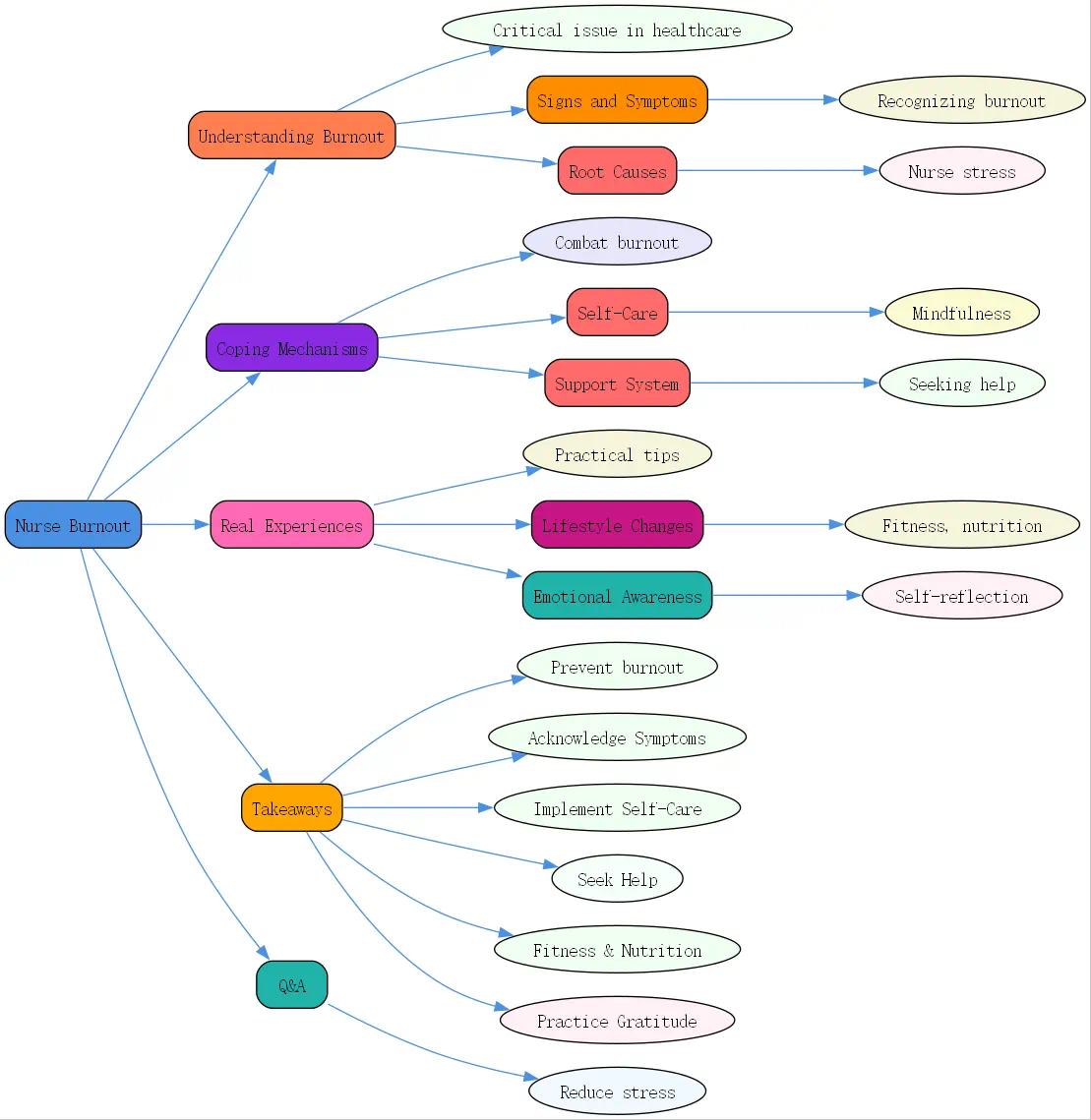Discover actionable strategies for addressing nurse burnout. Learn its signs, root causes, and expert-backed solutions to improve mental health and well-being.
Understanding Nurse Burnout: A Comprehensive Guide

Nurse burnout has become a critical issue in healthcare today, affecting both individuals and patient outcomes. Characterized by emotional exhaustion, persistent stress, and physical fatigue, nurse burnout impacts various nursing specialties, from ICU to palliative care. As healthcare workers continuously navigate high-pressure environments, finding ways to cope and manage burnout becomes vital.
What is Nurse Burnout? Recognizing the Signs and Symptoms
Defining Nurse Burnout: Mental, Physical, and Emotional Exhaustion
Nurse burnout refers to the state of mental, physical, and emotional fatigue caused by excessive workplace demands. It’s not just about being tired—it’s the kind of exhaustion that leaves individuals unable to perform effectively and feel engaged. Nurses often give their all, which can result in compromised mental and physical health over time.
Common Symptoms of Nurse Burnout: Fatigue, Brain Fog, and Depression
The symptoms of nurse burnout go beyond physical exhaustion. Many experience brain fog, where even simple tasks seem overwhelming, which can be particularly dangerous in high-stakes environments like the ICU. Other common symptoms include persistent fatigue, anxiety, depression, and even difficulty concentrating.
Mental Health Nurse Burnout: The Unique Challenges Faced
Mental health nurses face their own set of unique challenges. Frequently witnessing patient struggles can lead to compassion fatigue—a precursor to burnout. This issue is compounded by the stigma around seeking mental health help, making it harder for nurses in this field to openly address their struggles.
The Root Causes of Nurse Stress and Burnout
High-Stress Environments: ICU, COVID Units, and Beyond
Certain nursing specialties, such as ICU or COVID-19 units, heighten the risks of burnout given their demand for precision, vigilance, and quick decision-making. The pandemic exacerbated these challenges, pushing nurses to their physical and emotional limits.
Working Conditions: Long Hours, Staff Shortages, and Demanding Tasks
Nurses often work long shifts, back-to-back, in facilities where staff shortages place additional burdens on their shoulders. Without adequate support or time to recover, these conditions can quickly lead to complete burnout.
Emotional Toll: Dealing with Patient Suffering and Loss
Few jobs are as emotionally taxing as nursing. Nurses regularly face patient suffering, loss, and the emotional weight of caring for critically ill individuals. The cumulative emotional toll can drain even the most resilient individuals, contributing to stress and burnout over time.
Coping Mechanisms and Strategies to Combat Burnout Nurse Issues
Self-Care and Mindfulness Practices for Nurses

Morning Routine: Meditation, Mindfulness, and Centering Techniques
Establishing a morning routine can be transformative for combating nurse burnout. Devoting time to mindfulness or meditation before starting a demanding shift helps center the mind and prepare for what lies ahead. For some, this could include deep breathing exercises or guided meditation to reduce stress levels.
Gratitude Journaling: Focusing on the Positive Aspects of Life
Gratitude journaling, where individuals jot down moments or aspects they are thankful for, can significantly improve one’s mindset. This simple practice helps shift focus from challenges to positivity, empowering nurses to start their day on a hopeful note.
The Importance of Self-Care: You Can’t Pour from an Empty Cup
One crucial realization for many nurses is that self-care is non-negotiable. As the saying goes, “You cannot pour from an empty cup.” Taking time to care for one’s mental and physical health is essential for maintaining the quality care they provide to patients.
Seeking Professional Help and Building a Support System
Therapy: Addressing Depression and Developing Coping Skills
Seeking professional help through therapy can be a game-changer for nurses experiencing mental health challenges. Therapy helps individuals work through anxiety, depression, or emotional fatigue, while equipping them with tailored coping skills to manage workplace pressures. Nursing-specific interventions to manage anxiety, such as this guide, can be incredibly helpful.
Community and Support: Leaning on Friends and Family
Another vital component in combating burnout is building a strong support system. Honest conversations with friends and family can create a safety net, helping nurses feel less alone during difficult times. Supportive relationships also help nurture emotional resilience.
Nurse Burnout Quotes: Finding Inspiration and Validation
Sometimes, it’s the small things, like finding inspiration in nurse burnout quotes, that offer temporary relief. Reading relatable quotes reminds nurses that they’re not alone and that others have faced similar struggles and come out stronger.
Real Nurse Experiences and Practical Tips
Lifestyle Changes: Fitness, Nutrition, and Sobriety
The Role of Exercise: Improving Mental Health and Energy Levels
Multiple nurses emphasize the life-changing benefits of regular exercise. Movement—whether it’s through yoga, running, or indoor cycling—recharges both the body and mind. Even short, consistent workouts can enhance energy levels, improve focus, and promote better sleep.
Nutrition and Diet: Fueling Your Body for Optimal Performance
Good nutrition is another cornerstone of tackling burnout. Avoiding sugary beverages and processed food can significantly impact energy levels and mood. Simple changes, like starting the day with lemon water instead of sugar-heavy drinks, can provide a steady energy boost.

Quitting Alcohol: A Transformative Step Towards Mental Clarity
For some, sobriety has been a powerful tool in combating burnout. Giving up alcohol can lead to greater mental clarity, improved judgment, and a renewed sense of self. By avoiding substances that cloud emotions, nurses can develop deeper emotional awareness and healing.
Emotional Awareness and Self-Reflection

Journaling: A Space for Emotional Processing
Journaling enables nurses to better process their emotions and experiences. Setting aside a few minutes daily to reflect and write creates a space for self-healing and emotional expression.
Practicing Gratitude: Shifting Focus to Positivity
Returning to gratitude practices cannot be overstated. By focusing on what’s going well in their lives, nurses can reframe their perspective, which diminishes the weight of daily stressors.
Emotional Intelligence: Understanding and Acknowledging Feelings
Emotional intelligence, or the ability to understand and manage one’s emotions, plays a pivotal role in combatting burnout. Developing this awareness allows nurses to identify feelings of discomfort and implement strategies before burnout escalates further.
Takeaways: Steps to Address and Prevent Nurse Burnout
- Acknowledge Burnout Symptoms: Recognize the emotional, physical, and mental signs.
- Implement Daily Self-Care: Create a morning routine that includes meditation, gratitude journaling, and exercise.
- Seek Professional Help: Therapists and community support can provide customized solutions.
- Focus on Fitness & Nutrition: Regular movement and a healthy diet fuel not only the body but also the mind.
- Reflect & Practice Gratitude: Journaling and focusing on positivity can shift your mental and emotional state.
Q&A Section
What are some effective ways to reduce nurse stress and burnout in daily work life?
Reducing nurse stress and burnout begins with prioritizing self-care. Incorporating mindfulness practices like meditation or breathing exercises can help shift focus and reduce anxiety. Journaling and gratitude practices foster positivity, while physical activity boosts energy levels and promotes better mental health. Seeking therapy and leaning on a reliable support system also play a critical role. External resources, like nursing interventions to manage anxiety, can provide further actionable tips.
Finally, organizations need to support nurses by improving working conditions, addressing staff shortages, and promoting healthy work-life balance.




